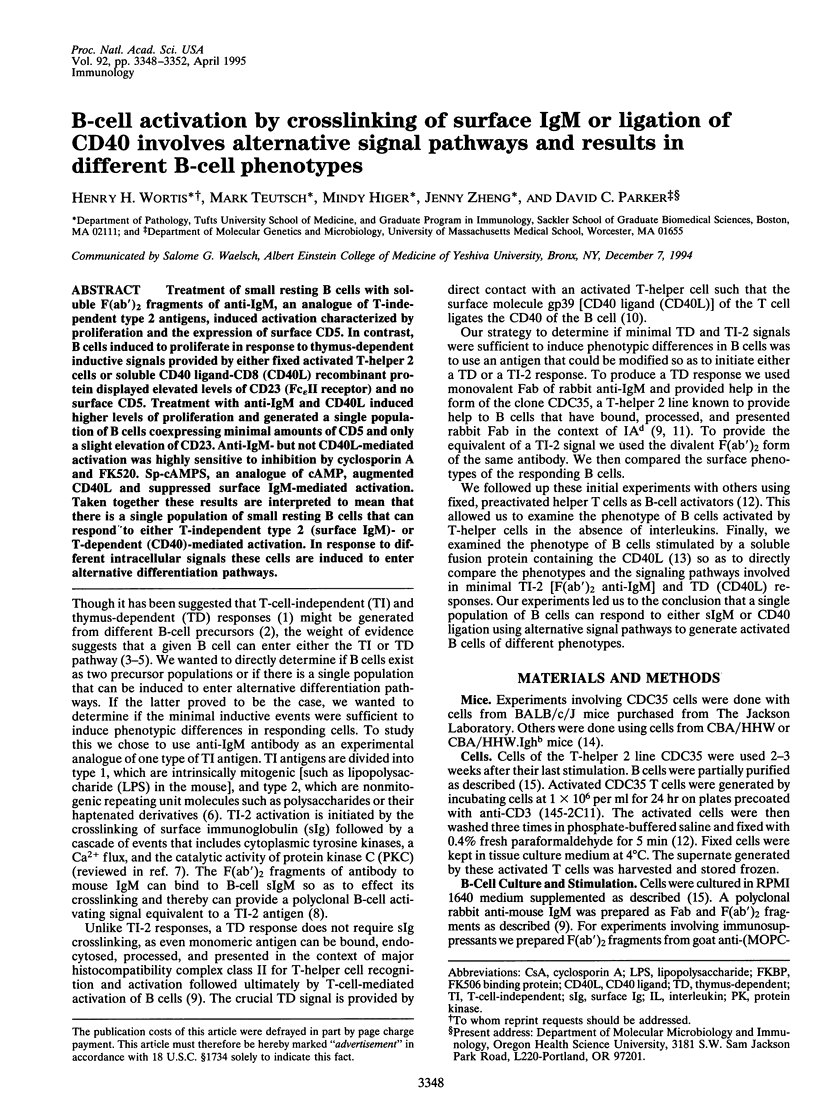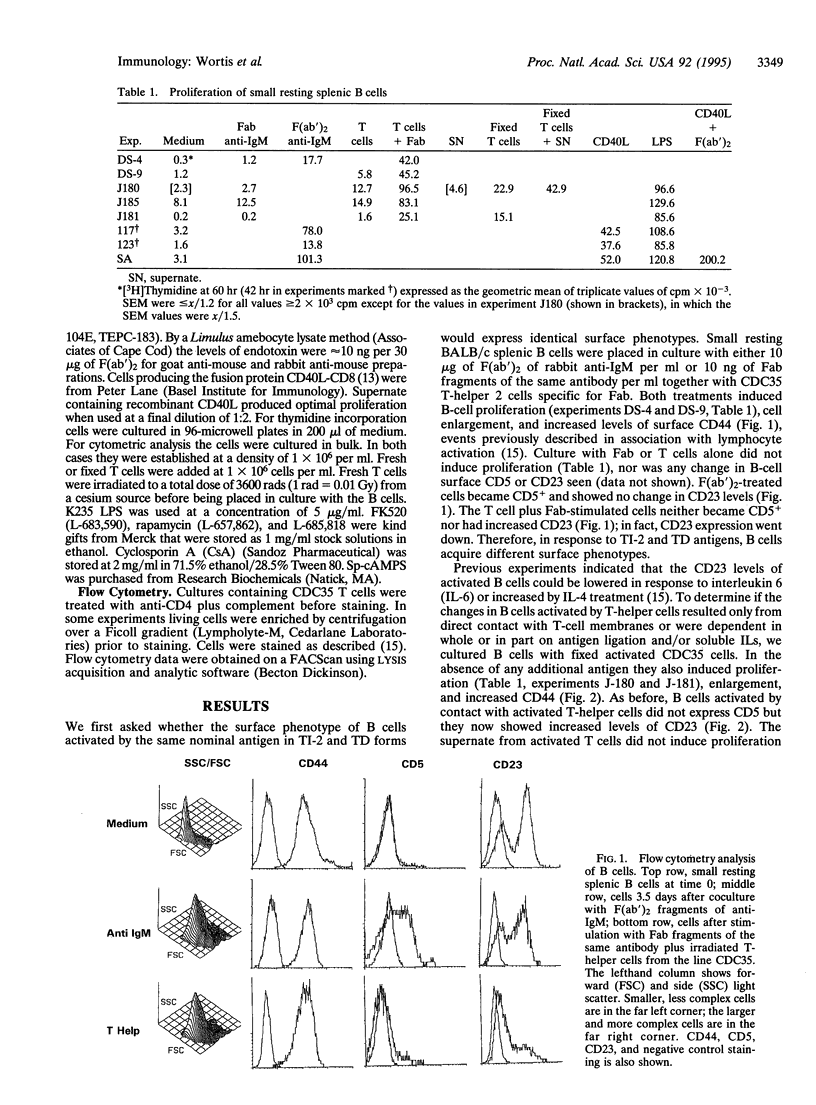Abstract
Treatment of small resting B cells with soluble F(ab')2 fragments of anti-IgM, an analogue of T-independent type 2 antigens, induced activation characterized by proliferation and the expression of surface CD5. In contrast, B cells induced to proliferate in response to thymus-dependent inductive signals provided by either fixed activated T-helper 2 cells or soluble CD40 ligand-CD8 (CD40L) recombinant protein displayed elevated levels of CD23 (Fc epsilon II receptor) and no surface CD5. Treatment with anti-IgM and CD40L induced higher levels of proliferation and generated a single population of B cells coexpressing minimal amounts of CD5 and only a slight elevation of CD23. Anti-IgM- but not CD40L-mediated activation was highly sensitive to inhibition by cyclosporin A and FK520. Sp-cAMPS, an analogue of cAMP, augmented CD40L and suppressed surface IgM-mediated activation. Taken together these results are interpreted to mean that there is a single population of small resting B cells that can respond to either T-independent type 2 (surface IgM)- or T-dependent (CD40)-mediated activation. In response to different intracellular signals these cells are induced to enter alternative differentiation pathways.
Full text
PDF




Selected References
These references are in PubMed. This may not be the complete list of references from this article.
- Armitage R. J., Fanslow W. C., Strockbine L., Sato T. A., Clifford K. N., Macduff B. M., Anderson D. M., Gimpel S. D., Davis-Smith T., Maliszewski C. R. Molecular and biological characterization of a murine ligand for CD40. Nature. 1992 May 7;357(6373):80–82. doi: 10.1038/357080a0. [DOI] [PubMed] [Google Scholar]
- Arnold L. W., Pennell C. A., McCray S. K., Clarke S. H. Development of B-1 cells: segregation of phosphatidyl choline-specific B cells to the B-1 population occurs after immunoglobulin gene expression. J Exp Med. 1994 May 1;179(5):1585–1595. doi: 10.1084/jem.179.5.1585. [DOI] [PMC free article] [PubMed] [Google Scholar]
- Beyers A. D., Spruyt L. L., Williams A. F. Molecular associations between the T-lymphocyte antigen receptor complex and the surface antigens CD2, CD4, or CD8 and CD5. Proc Natl Acad Sci U S A. 1992 Apr 1;89(7):2945–2949. doi: 10.1073/pnas.89.7.2945. [DOI] [PMC free article] [PubMed] [Google Scholar]
- Bram R. J., Hung D. T., Martin P. K., Schreiber S. L., Crabtree G. R. Identification of the immunophilins capable of mediating inhibition of signal transduction by cyclosporin A and FK506: roles of calcineurin binding and cellular location. Mol Cell Biol. 1993 Aug;13(8):4760–4769. doi: 10.1128/mcb.13.8.4760. [DOI] [PMC free article] [PubMed] [Google Scholar]
- Burkly L. C., Wortis H. H. T cell regulation of light chain expression: preferential enhancement of Ig kappa production by T cells in the response to DNP. J Immunol. 1985 Sep;135(3):1577–1581. [PubMed] [Google Scholar]
- Cambier J. C., Pleiman C. M., Clark M. R. Signal transduction by the B cell antigen receptor and its coreceptors. Annu Rev Immunol. 1994;12:457–486. doi: 10.1146/annurev.iy.12.040194.002325. [DOI] [PubMed] [Google Scholar]
- Choi M. S., Brines R. D., Holman M. J., Klaus G. G. Induction of NF-AT in normal B lymphocytes by anti-immunoglobulin or CD40 ligand in conjunction with IL-4. Immunity. 1994 Jun;1(3):179–187. doi: 10.1016/1074-7613(94)90096-5. [DOI] [PubMed] [Google Scholar]
- Clipstone N. A., Crabtree G. R. Identification of calcineurin as a key signalling enzyme in T-lymphocyte activation. Nature. 1992 Jun 25;357(6380):695–697. doi: 10.1038/357695a0. [DOI] [PubMed] [Google Scholar]
- Cong Y. Z., Rabin E., Wortis H. H. Treatment of murine CD5- B cells with anti-Ig, but not LPS, induces surface CD5: two B-cell activation pathways. Int Immunol. 1991 May;3(5):467–476. doi: 10.1093/intimm/3.5.467. [DOI] [PubMed] [Google Scholar]
- Conrad D. H. Fc epsilon RII/CD23: the low affinity receptor for IgE. Annu Rev Immunol. 1990;8:623–645. doi: 10.1146/annurev.iy.08.040190.003203. [DOI] [PubMed] [Google Scholar]
- Dumont F. J., Staruch M. J., Koprak S. L., Siekierka J. J., Lin C. S., Harrison R., Sewell T., Kindt V. M., Beattie T. R., Wyvratt M. The immunosuppressive and toxic effects of FK-506 are mechanistically related: pharmacology of a novel antagonist of FK-506 and rapamycin. J Exp Med. 1992 Sep 1;176(3):751–760. doi: 10.1084/jem.176.3.751. [DOI] [PMC free article] [PubMed] [Google Scholar]
- Forman M. S., Puré E. T-independent and T-dependent B lymphoblasts: helper T cells prime for interleukin 2-induced growth and secretion of immunoglobulins that utilize downstream heavy chains. J Exp Med. 1991 Mar 1;173(3):687–697. doi: 10.1084/jem.173.3.687. [DOI] [PMC free article] [PubMed] [Google Scholar]
- Freedman A. S., Freeman G., Whitman J., Segil J., Daley J., Levine H., Nadler L. M. Expression and regulation of CD5 on in vitro activated human B cells. Eur J Immunol. 1989 May;19(5):849–855. doi: 10.1002/eji.1830190511. [DOI] [PubMed] [Google Scholar]
- Hasbold J., Klaus G. G. B cells from CBA/N mice do not proliferate following ligation of CD40. Eur J Immunol. 1994 Jan;24(1):152–157. doi: 10.1002/eji.1830240123. [DOI] [PubMed] [Google Scholar]
- Haughton G., Arnold L. W., Whitmore A. C., Clarke S. H. B-1 cells are made, not born. Immunol Today. 1993 Feb;14(2):84–91. doi: 10.1016/0167-5699(93)90064-R. [DOI] [PubMed] [Google Scholar]
- Herzenberg L. A., Kantor A. B. B-cell lineages exist in the mouse. Immunol Today. 1993 Feb;14(2):79–90. doi: 10.1016/0167-5699(93)90063-Q. [DOI] [PubMed] [Google Scholar]
- Hidaka T., Kitani A., Hara M., Harigai M., Suzuki K., Kawaguchi Y., Ishizuka T., Kawagoe M., Nakamura H. IL-4 down-regulates the surface expression of CD5 on B cells and inhibits spontaneous immunoglobulin and IgM-rheumatoid factor production in patients with rheumatoid arthritis. Clin Exp Immunol. 1992 Aug;89(2):223–229. doi: 10.1111/j.1365-2249.1992.tb06936.x. [DOI] [PMC free article] [PubMed] [Google Scholar]
- Jain J., McCaffrey P. G., Miner Z., Kerppola T. K., Lambert J. N., Verdine G. L., Curran T., Rao A. The T-cell transcription factor NFATp is a substrate for calcineurin and interacts with Fos and Jun. Nature. 1993 Sep 23;365(6444):352–355. doi: 10.1038/365352a0. [DOI] [PubMed] [Google Scholar]
- Jyonouchi H., Voss R. M., Good R. A. Up-regulation and down-regulation of cell surface and mRNA expression of CD5 antigen by various humoral factors on murine 70Z/3 pre-B cell leukemia cell line: IL-4 down-regulates CD5 antigen expression. Cell Immunol. 1990 Oct 1;130(1):66–78. doi: 10.1016/0008-8749(90)90162-k. [DOI] [PubMed] [Google Scholar]
- Katira A., Knox K. A., Finney M., Michell R. H., Wakelam M., Gordon J. Inhibition by glucocorticoid and staurosporine of IL-4-dependent CD23 production in B lymphocytes is reversed on engaging CD40. Clin Exp Immunol. 1993 May;92(2):347–352. doi: 10.1111/j.1365-2249.1993.tb03403.x. [DOI] [PMC free article] [PubMed] [Google Scholar]
- Kato T., Kokuho T., Tamura T., Nariuchi H. Mechanisms of T cell contact-dependent B cell activation. J Immunol. 1994 Mar 1;152(5):2130–2138. [PubMed] [Google Scholar]
- Kawakami K., Parker D. C. Antigen and helper T lymphocytes activate B lymphocytes by distinct signaling pathways. Eur J Immunol. 1993 Jan;23(1):77–84. doi: 10.1002/eji.1830230113. [DOI] [PubMed] [Google Scholar]
- Klaus G. G., Choi M. S., Holman M. Properties of mouse CD40. Ligation of CD40 activates B cells via a Ca(++)-dependent, FK506-sensitive pathway. Eur J Immunol. 1994 Dec;24(12):3229–3232. doi: 10.1002/eji.1830241248. [DOI] [PubMed] [Google Scholar]
- Knox K. A., Gordon J. Protein tyrosine phosphorylation is mandatory for CD40-mediated rescue of germinal center B cells from apoptosis. Eur J Immunol. 1993 Oct;23(10):2578–2584. doi: 10.1002/eji.1830231030. [DOI] [PubMed] [Google Scholar]
- Lalmanach-Girard A. C., Chiles T. C., Parker D. C., Rothstein T. L. T cell-dependent induction of NF-kappa B in B cells. J Exp Med. 1993 Apr 1;177(4):1215–1219. doi: 10.1084/jem.177.4.1215. [DOI] [PMC free article] [PubMed] [Google Scholar]
- Lane P., Brocker T., Hubele S., Padovan E., Lanzavecchia A., McConnell F. Soluble CD40 ligand can replace the normal T cell-derived CD40 ligand signal to B cells in T cell-dependent activation. J Exp Med. 1993 Apr 1;177(4):1209–1213. doi: 10.1084/jem.177.4.1209. [DOI] [PMC free article] [PubMed] [Google Scholar]
- Lankester A. C., van Schijndel G. M., Cordell J. L., van Noesel C. J., van Lier R. A. CD5 is associated with the human B cell antigen receptor complex. Eur J Immunol. 1994 Apr;24(4):812–816. doi: 10.1002/eji.1830240406. [DOI] [PubMed] [Google Scholar]
- Liu J., Farmer J. D., Jr, Lane W. S., Friedman J., Weissman I., Schreiber S. L. Calcineurin is a common target of cyclophilin-cyclosporin A and FKBP-FK506 complexes. Cell. 1991 Aug 23;66(4):807–815. doi: 10.1016/0092-8674(91)90124-h. [DOI] [PubMed] [Google Scholar]
- Maliszewski C. R., Grabstein K., Fanslow W. C., Armitage R., Spriggs M. K., Sato T. A. Recombinant CD40 ligand stimulation of murine B cell growth and differentiation: cooperative effects of cytokines. Eur J Immunol. 1993 May;23(5):1044–1049. doi: 10.1002/eji.1830230510. [DOI] [PubMed] [Google Scholar]
- Marshall L. S., Shepherd D. M., Ledbetter J. A., Aruffo A., Noelle R. J. Signaling events during helper T cell-dependent B cell activation. I. Analysis of the signal transduction pathways triggered by activated helper T cell in resting B cells. J Immunol. 1994 May 15;152(10):4816–4825. [PubMed] [Google Scholar]
- Mongini P. K., Paul W. E., Metcalf E. S. T cell regulation of immunoglobulin class expression in the antibody response to trinitrophenyl-ficoll. Evidence for T cell enhancement of the immunoglobulin class switch. J Exp Med. 1982 Mar 1;155(3):884–902. doi: 10.1084/jem.155.3.884. [DOI] [PMC free article] [PubMed] [Google Scholar]
- Mosier D. E., Mond J. J., Goldings E. A. The ontogeny of thymic independent antibody responses in vitro in normal mice and mice with an X-linked B cell defect. J Immunol. 1977 Dec;119(6):1874–1878. [PubMed] [Google Scholar]
- Parker D. C., Wadsworth D. C., Schneider G. B. Activation of murine B lymphocytes by anti-immunoglobulin is an inductive signal leading to immunoglobulin secretion. J Exp Med. 1980 Jul 1;152(1):138–150. doi: 10.1084/jem.152.1.138. [DOI] [PMC free article] [PubMed] [Google Scholar]
- Pollok K. E., O'Brien V., Marshall L., Olson J. W., Noelle R. J., Snow E. C. The development of competence in resting B cells. The induction of cyclic AMP and ornithine decarboxylase activity after direct contact between B and T helper cells. J Immunol. 1991 Mar 1;146(5):1633–1641. [PubMed] [Google Scholar]
- Saeland S., Duvert V., Moreau I., Banchereau J. Human B cell precursors proliferate and express CD23 after CD40 ligation. J Exp Med. 1993 Jul 1;178(1):113–120. doi: 10.1084/jem.178.1.113. [DOI] [PMC free article] [PubMed] [Google Scholar]
- Schreiber S. L., Crabtree G. R. The mechanism of action of cyclosporin A and FK506. Immunol Today. 1992 Apr;13(4):136–142. doi: 10.1016/0167-5699(92)90111-J. [DOI] [PubMed] [Google Scholar]
- Sharon R., McMaster P. R., Kask A. M., Owens J. D., Paul W. E. DNP-Lys-ficoll: a T-independent antigen which elicits both IgM and IgG anti-DNP antibody-secreting cells. J Immunol. 1975 May;114(5):1585–1589. [PubMed] [Google Scholar]
- Sigal N. H., Dumont F. J. Cyclosporin A, FK-506, and rapamycin: pharmacologic probes of lymphocyte signal transduction. Annu Rev Immunol. 1992;10:519–560. doi: 10.1146/annurev.iy.10.040192.002511. [DOI] [PubMed] [Google Scholar]
- Tarakhovsky A., Müller W., Rajewsky K. Lymphocyte populations and immune responses in CD5-deficient mice. Eur J Immunol. 1994 Jul;24(7):1678–1684. doi: 10.1002/eji.1830240733. [DOI] [PubMed] [Google Scholar]
- Teutsch M., Higer M., Wang D., Wortis H. W. Induction of CD5 on B and T cells is suppressed by cyclosporin A, FK-520 and rapamycin. Int Immunol. 1995 Mar;7(3):381–392. doi: 10.1093/intimm/7.3.381. [DOI] [PubMed] [Google Scholar]
- Tony H. P., Parker D. C. Major histocompatibility complex-restricted, polyclonal B cell responses resulting from helper T cell recognition of antiimmunoglobulin presented by small B lymphocytes. J Exp Med. 1985 Jan 1;161(1):223–241. doi: 10.1084/jem.161.1.223. [DOI] [PMC free article] [PubMed] [Google Scholar]
- Tony H. P., Phillips N. E., Parker D. C. Role of membrane immunoglobulin (Ig) crosslinking in membrane Ig-mediated, major histocompatibility-restricted T cell-B cell cooperation. J Exp Med. 1985 Nov 1;162(5):1695–1708. doi: 10.1084/jem.162.5.1695. [DOI] [PMC free article] [PubMed] [Google Scholar]
- Umetsu D. T., Chapman-Alexander J. M., Thorbecke G. J. Cross-priming of murine B cells with TNP conjugates of hemocyanin and Ficoll: characteristics of primed B cells responding to both antigens. J Immunol. 1979 Jul;123(1):396–404. [PubMed] [Google Scholar]
- Van Haastert P. J., Van Driel R., Jastorff B., Baraniak J., Stec W. J., De Wit R. J. Competitive cAMP antagonists for cAMP-receptor proteins. J Biol Chem. 1984 Aug 25;259(16):10020–10024. [PubMed] [Google Scholar]
- Waldschmidt T. J., Kroese F. G., Tygrett L. T., Conrad D. H., Lynch R. G. The expression of B cell surface receptors. III. The murine low-affinity IgE Fc receptor is not expressed on Ly 1 or 'Ly 1-like' B cells. Int Immunol. 1991 Apr;3(4):305–315. doi: 10.1093/intimm/3.4.305. [DOI] [PubMed] [Google Scholar]
- Zupo S., Dono M., Massara R., Taborelli G., Chiorazzi N., Ferrarini M. Expression of CD5 and CD38 by human CD5- B cells: requirement for special stimuli. Eur J Immunol. 1994 Jun;24(6):1426–1433. doi: 10.1002/eji.1830240628. [DOI] [PubMed] [Google Scholar]


